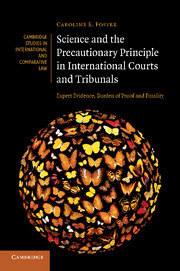 Science and the Precautionary Principle in International Courts and Tribunals
Science and the Precautionary Principle in International Courts and Tribunals Book contents
7 - Finality, revision and nullity in scientific cases
Published online by Cambridge University Press: 11 April 2011
Summary
The judgments and awards of international courts and tribunals provide points of stability in international politics, permanently allocating resources and responsibility according to law. They offer disputing parties a decision that will enable them to close down their disputes and move on. They also reinforce the status of the law and help to clarify and develop its content. The finality of international adjudication is important in enabling international courts' and tribunals' decisions to fulfil these systemic functions. For judgments and awards dependent on continually advancing scientific research there is thus an awkward problem. Within a relatively short period of time it is always possible that new scientific evidence could show a judgment or award to have been based on erroneous factual foundations.
The principle of finality should not be seen as an end in itself. Appropriately circumscribed processes of review are also an essential aspect of international adjudication. International law has always readily accommodated the need for procedures allowing the rectification, interpretation and even the revision of judgments and awards. On rare occasions, express provision is also made by an international court or tribunal for a decision to be revisited, as in the Nuclear Tests cases (Australia v. France) (New Zealand v. France). There are also other case-specific rubrics under which the parties might return to the courtroom. In the Case concerning the Gabčíkovo-Nagymaros Project (Hungary/Slovakia), Slovakia invoked Article 5(3) of its Special Agreement with Slovakia in 1998.
- Type
- Chapter
- Information
- Science and the Precautionary Principle in International Courts and TribunalsExpert Evidence, Burden of Proof and Finality, pp. 281 - 317Publisher: Cambridge University PressPrint publication year: 2011


